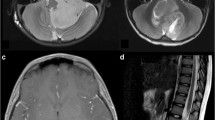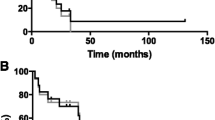Abstract
Chemotherapy has been used extensively in the management of children with intracranial ependymoma. In this review, we discuss the results of phase II studies and clinical trials conducted in newly diagnosed and recurrent ependymomas. There is little evidence that chemotherapy is effective in this tumour. The response rate to single agents is 11%, with less than 5% complete responses, cisplatin being the most active agent in phase II studies. Combinations may be more effective, although the response rate with high-dose regimens is disappointing. Early results of protocols conducted in infants and young children do not suggest that chemotherapy is beneficial. A more rigorous assessment of chemotherapy is required in order to define its role in patients with intracranial ependymomas. Indeed, it is difficult to justify the use of chemotherapy outside such studies. More large studies, perhaps intergroup, limited to children with ependymomas would be of particular value.
Similar content being viewed by others
Author information
Authors and Affiliations
Additional information
Received: 12 April 1999
Rights and permissions
About this article
Cite this article
Bouffet, E., Foreman, N. Chemotherapy for intracranial ependymomas. Child's Nerv Syst 15, 563–570 (1999). https://doi.org/10.1007/s003810050544
Issue Date:
DOI: https://doi.org/10.1007/s003810050544




